Public Scholarship
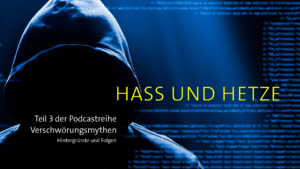
Podcast on Hate Speech and Online Misogyny
July 2023
In a new podcast produced by the Bavarian Academy of Sciences, Matthias Quent, Andrea Abele-Brehm, Sahana Udupa, Christoph Neuberger, Anna Wegscheider, Marina Chernivsky, Max Czollek, Astrid Seville, Irma Trommer and Marina Weisband discuss the proliferation of interlinked forms of extreme speech. The podcast is hosted by Laura Robber and Ruth Zapf.
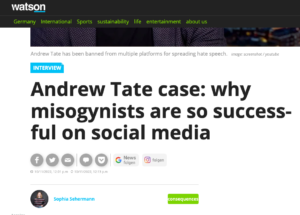
Interview for Watson.de on online misogyny
Sophia Sichtermann, 11 October 2022
Sophia Sichtermann interviewed Sahana Udupa for Watson.de about hate influencers and online misogyny. Udupa highlighted the need for robust school and university education to counter regressive narratives masquerading as ‘knowledge’ on social media, especially how young online users are targeted by youthful conversational and narrative styles that hate influencers employ.
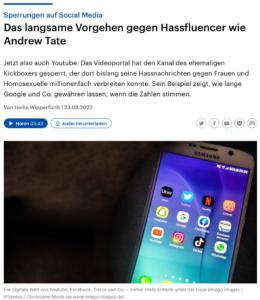
Das langsame Vorgehen gegen Hassfluencer wie Andrew Tate
Heike Wippenfürth, 23 August 2022
In a news feature on social media hate influencers and misogynists online, Deutschlandfunk journalist Heike Wippenfürth spoke to Sahana Udupa about her research. Udupa pointed out that account suspensions will lead to hate influencers losing some momentum and audiences, but they will also go underground and find new ways.
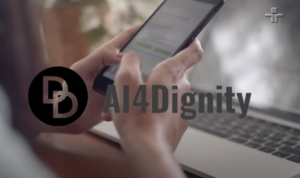
Brazilian television channel TV Cultura interviewed Sahana Udupa in their program on hate speech moderation and social media. Udupa highlighted the limitations of AI-assisted content moderation and how culturally coded expressions tend to escape content filters. She discussed the findings of AI4Dignity, the European Research Council funded proof of concept project, which has created a collaborative process model for involving communities in bringing cultural and contextual nuance to machine learning models.
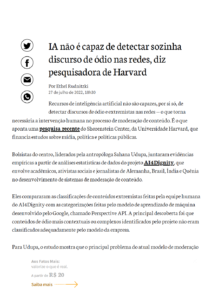
IA não é capaz de detectar sozinha discurso de ódio nas redes, diz pesquisadora de Harvard
Ethel Rudnitzki, 27 July 2022
In an interview for the Brazilian news organization, Aos Fatos, Sahana Udupa spoke with Ethel Rudnitzki to highlight the challenges of online content moderation especially during election times. The interview was published as part of a series of reports Aos Fatos has published in the runup to the presidential elections in the country. Aos Fatos focuses on fact-checking and investigates disinformation and misinformation networks on social media.
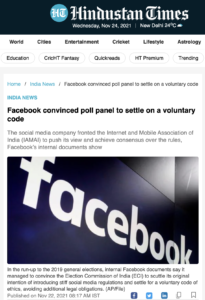
Facebook convinced poll panel to settle on a voluntary code
Venkat Ananth & Deeksha Bhardwaj, 22 November 2021
“The voluntary code that was drawn (up) during the 2019 general elections was weak and insufficient, not least because of the very manner in which it was created…Double distancing on the part of the social media companies—first from being direct parties and second from enforceable obligation—showed that the voluntary code arrangement was weak from its very inception.” Sahana Udupa quoted in the article.

"At the heart of digital capitalism"
Lena Reuter & Sahana Udupa, 29 September 2020
Are social media connecting us or tearing society apart? How do trolls, fake news, memes, and online misinformation impact upon politics today? The Gerda Henkel Stiftung interviews project PI Udupa on critical aspects of digital politics. Here is the link to the full interview.
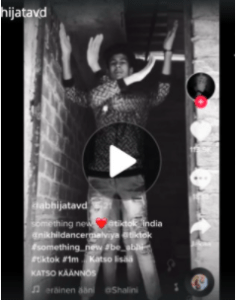
Tiktok and social media politics in India: ONLINERPOL research cited by Finnish Public Broadcasting Corporation
Maria Tolsa, 20 September 2020
Finnish Public Broadcasting Corporation “Yle” interviewed project PI Sahana Udupa on the impact of social media in mobilizing protests and conveying political messages in India, in the context of the Indian government’s decision to ban TikTok. Here is the link to the full article.
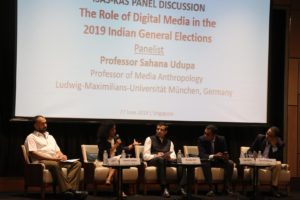
Social media in Indian general elections
Katharina Naumann, 2 July 2020
Konrad Adenauer Stiftung published a report on the public discussion organized in Singapore on the role of social media in Indian general elections, featuring Sahana Udupa’s comments that the impact of social media should be studied beyond the electoral results as they have enabled far reaching cultural shifts in political discourse. Read the full report here.

KULTUR IST KEINE WARE, SIE IST EINE LEBENSWEISE: INTERVIEW WITH SAHANA UDUPA
Sahana Udupa, Anika Landsteiner · 26 November 2019
Welche Bedeutung hat Cultural Appreciation heute online und offline? Mit Qiio spricht die aus Bangalore, Indien, stammende Medienanthropologin darüber, welche Faktoren für Cultural Appreciation online und offline wichtig sind, warum sie Memes kritisch gegenübersteht und wie sich kulturelle Anerkennung von Aneignung abgrenzen lässt.

COMPLEX CHALLENGES OF EXTREME SPEECH ONLINE CAN ONLY BE TACKLED IF MULTIPLE STAKEHOLDERS COLLABORATE
Elonnai Hickok & Sahana Udupa · Jun 21, 2019 · 12:30 pm
This special compilation demonstrates that addressing the contested space of online extreme speech and internet communication is a layered and complex challenge that requires collaboration from multiple stakeholders.We have articulated a set of priorities that emerged over the course of the discussions and writings. This list is not comprehensive and does not capture or represent every viewpoint but seeks to jumpstart a larger and more comprehensive discussion on addressing the challenges facing online content in India today.
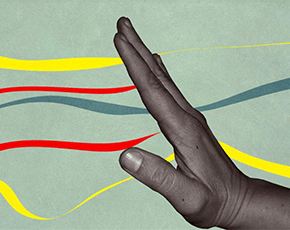
CIVIL SOCIETY, INDUSTRY AND GOVERNMENT MUST JOIN HANDS TO PROTECT FREE SPEECH, CURB EXTREME SPEECH
Robert Faris · May 27, 2019 · 07:30 pm
Our next challenge is to find the mix of tools and approaches that strengthen public discourse that work in the digital age.
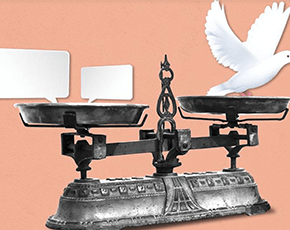
DEBATE OVER REGULATING RIGHT-WING EXTREME SPEECH ONLINE MUST SHIFT TO HARMS SUCH SPEECH CAN CAUSE
Bharath Ganesh · May 26, 2019 · 08:00 am
Prioritising free speech above the harms that extreme speech may cause has dominated the moderation strategies of social media platforms.
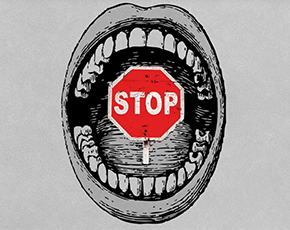
ANY REGULATION OF ONLINE SPEECH IN INDIA MUST SAFEGUARD THE RIGHTS TO FREE SPEECH AND PRIVACY
SFLC.in · May 15, 2019 · 06:30 pm
The law should also enable a quick take-down of content determined as illegal by the judiciary or appropriate government agencies.

TO ADDRESS EXTREME ONLINE CONTENT, ESPECIALLY OF THE POLITICAL KIND, AN ECOSYSTEM APPROACH IS NEEDED
Elonnai Hickok · May 14, 2019 · 06:30 pm
The ecosystem around the creation of content, including that related to elections, as well as its dissemination, promotion and consumption is complex.

FACT-CHECKING VIGILANTES IN INDIA ARE A BULWARK AGAINST THE MOVE TO A ‘POST-TRUTH’ WORLD
Sangeet Kumar · May 13, 2019 · 12:30 pm
The ecosystem of fact checking in India cuts across digital, television, and print media and even crosses over into the corporate domain.
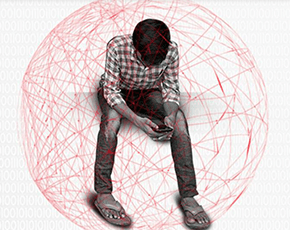
EXTREME SPEECH: A PEOPLE-CENTRIC APPROACH WILL HELP HOLD GOVERNMENTS, SOCIAL MEDIA FIRMS ACCOUNTABLE
Sahana Udupa · May 12, 2019 · 08:00 am
Globally, content moderation around extreme speech has been difficult partly because of its elusive formats, inability to account for context, coded language.

STRATEGIES TO TACKLE EXTREME SPEECH ON WHATSAPP MUST BRING TOGETHER SOCIO-POLITICAL, DIGITAL WORLDS
Lipika Kamra & Philippa Williams · May 11, 2019 · 08:00 am
Research has shown that the circulation of digital content characterised as ‘extreme speech’ informs everyday public opinion.
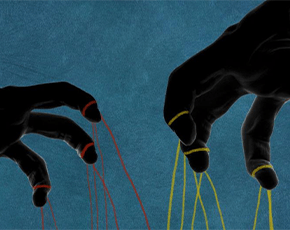
HOW FAR CAN POLITICAL PARTIES IN INDIA BE MADE ACCOUNTABLE FOR THEIR DIGITAL PROPAGANDA?
Amogh Dhar Sharma · May 10, 2019 · 08:00 am
An army of unpaid volunteers are being used to spread political propaganda and fake news. This allows parties to shirk accountability

CAN EXTREME SPEECH ONLINE BE REGULATED WITHOUT CURBING FREE SPEECH? THIS SERIES FINDS OUT
Sahana Udupa, Elonnai Hickok, Edward Anderson · May 09, 2019 · 08:00 am
The articles highlight policy interventions, company practice, and civic intervention urgently needed to address the current challenges in online communication.
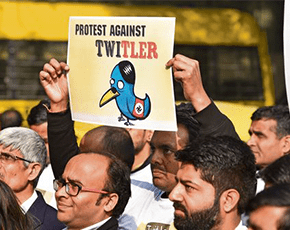
THE WANNABE VICTIMS: INDIA’S ONLINE RIGHT
15 Feb 2019
The past 10 years have witnessed the rise of digital ideological warriors. Who are they and what motivates them?

THE HINDU COLUMN FEATURES PROJECT PODCAST “ONLINE GODS”
24 November 2018
You know a medium has edged into the mainstream when everyone wants a piece of it; entertainers, news disseminators, persuaders, educators, even academic researchers.

“DIGITAL POLITICS IN MILLENNIAL INDIA” SYMPOSIUM 2018
16 March 2018
New Delhi, 16 March 2018: The national capital witnessed the grand launch of the International Symposium titled ‘Digital Politics in Millenial India’ at the New Academic Block of IIIT-Delhi.
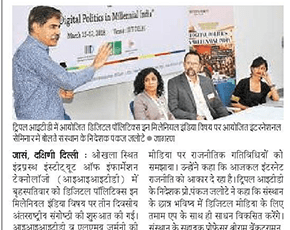
DAINIK JAGRAN REPORT ON “DIGITAL POLITICS IN MILLENNIAL INDIA” SYMPOSIUM 2018
15 March 2018
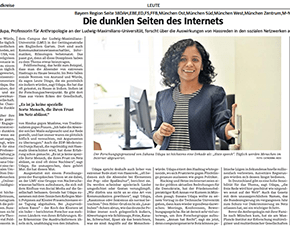
INTERVIEW IN SUDDEUTSCHE ZEITUNG
6 March 2018
München – Es geht um unsere Würde, sagt sie. Unsere digitale Würde, die täglich angegriffen wird. Aus unterschiedlichen Motiven, abermit ähnlichenMethoden, sei es von Trump-Anhängern in den USA
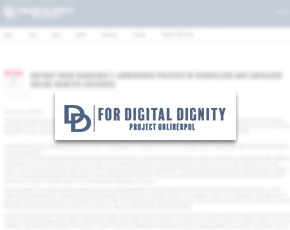
MAYMAY WAHI BANAENGE I: AMBIGUOUS POLITICS IN GLOBALIZED AND LOCALIZED ONLINE MEMETIC CULTURES
06 July 2018
This post will begin with an example, and it is hoped that the process of fleshing it out shall help in identifying the dynamic processes that are involved in defining a meme

INTERNET SHUTDOWNS: AMENDMENT TO THE TELEGRAPH ACT AND MOBILE COMPANY LICENSES
03 April 2018
This blog post is the second in a series of blog posts from the project “Law, religious violence and Internet and social media regulation in India” funded by ONLINERPOL.
TV Cultura, 27 July 2022
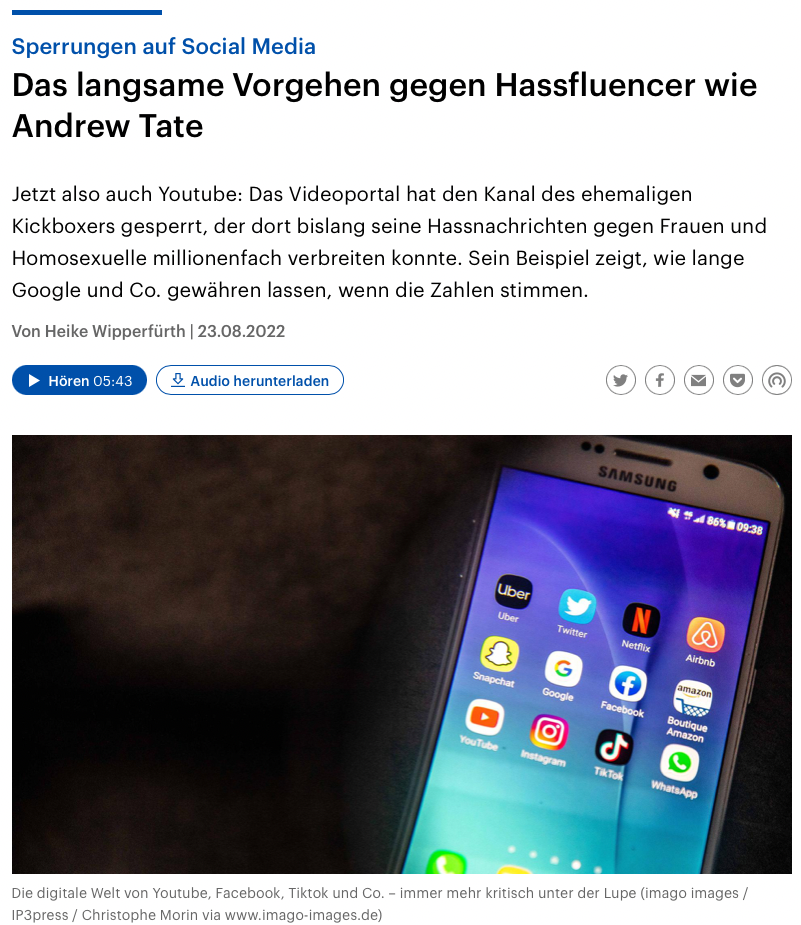
Das langsame Vorgehen gegen Hassfluencer wie Andrew Tate
Heike Wippenfürth, 23 August 2022
In a news feature on social media hate influencers and misogynists online, Deutschlandfunk journalist Heike Wippenfürth spoke to Sahana Udupa about her research. Udupa pointed out that account suspensions will lead to hate influencers losing some momentum and audiences, but they will also go underground and find new ways.
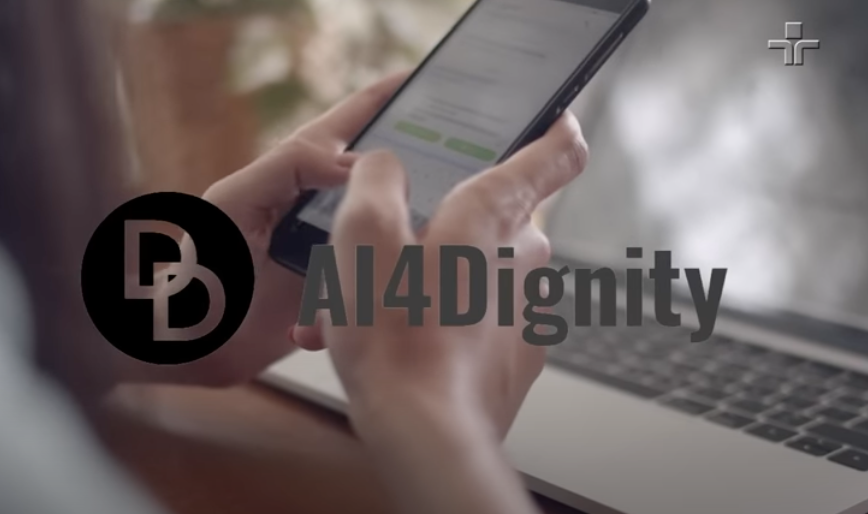
Brazilian television channel TV Cultura features AI4Dignity
Brazilian television channel TV Cultura interviewed Sahana Udupa in their program on hate speech moderation and social media. Udupa highlighted the limitations of AI-assisted content moderation and how culturally coded expressions tend to escape content filters. She discussed the findings of AI4Dignity, the European Research Council funded proof of concept project, which has created a collaborative process model for involving communities in bringing cultural and contextual nuance to machine learning models.
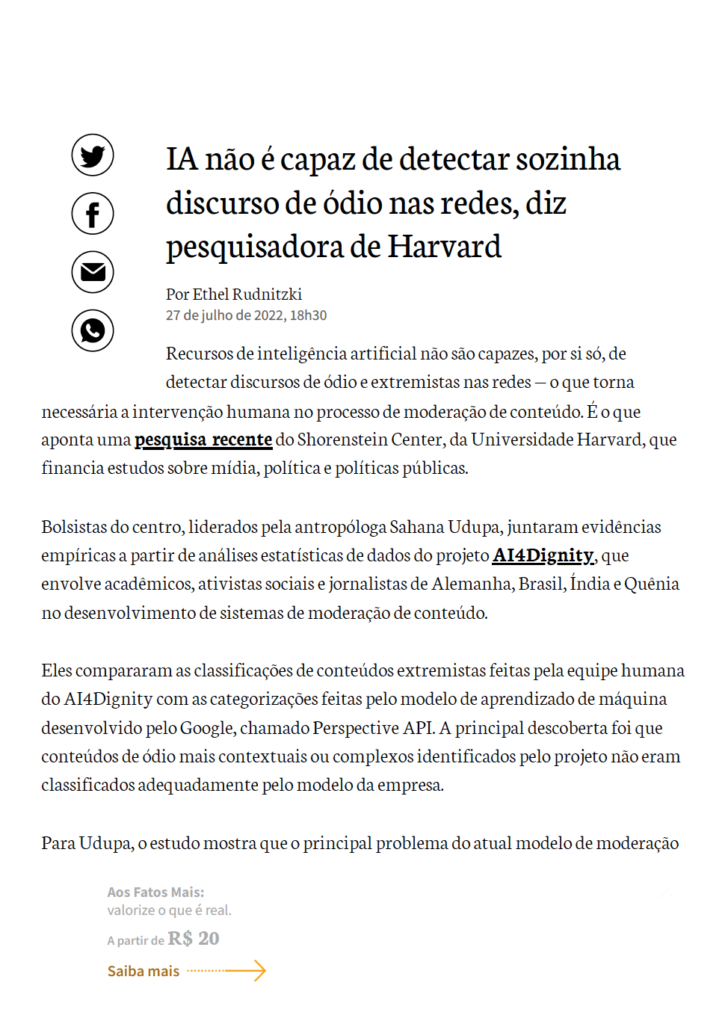
IA não é capaz de detectar sozinha discurso de ódio nas redes, diz pesquisadora de Harvard
Ethel Rudnitzki, 27 July 2022
In an interview for the Brazilian news organization, Aos Fatos, Sahana Udupa spoke with Ethel Rudnitzki to highlight the challenges of online content moderation especially during election times. The interview was published as part of a series of reports Aos Fatos has published in the runup to the presidential elections in the country. Aos Fatos focuses on fact-checking and investigates disinformation and misinformation networks on social media.
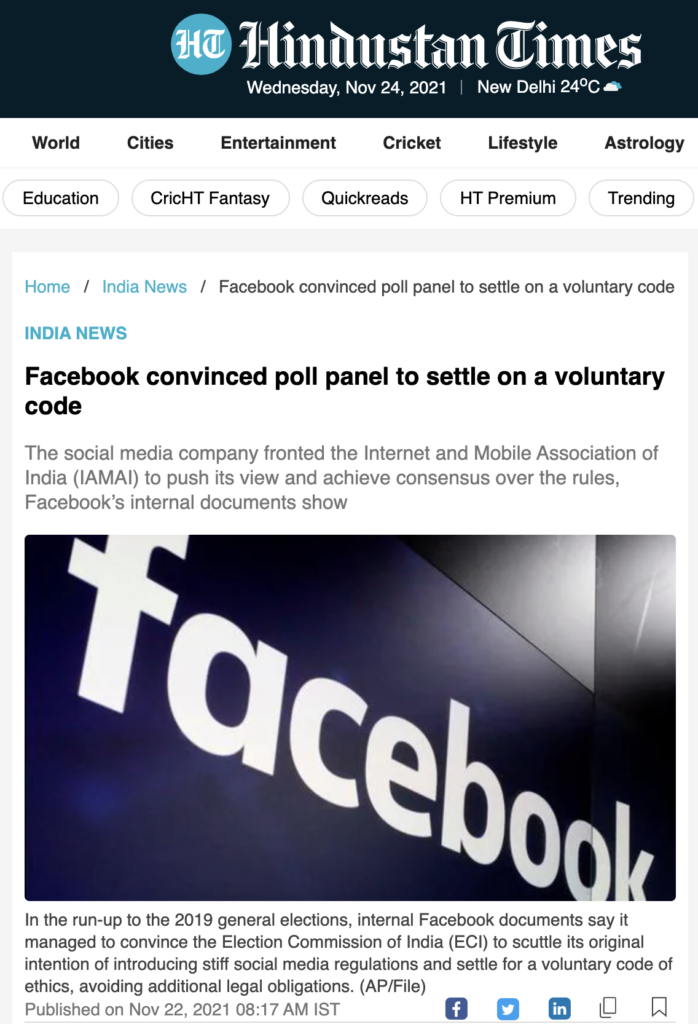
Facebook convinced poll panel to settle on a voluntary code
Venkat Ananth & Deeksha Bhardwaj, 22 November 2021
“The voluntary code that was drawn (up) during the 2019 general elections was weak and insufficient, not least because of the very manner in which it was created…Double distancing on the part of the social media companies—first from being direct parties and second from enforceable obligation—showed that the voluntary code arrangement was weak from its very inception.” Sahana Udupa quoted in the article.

"At the heart of digital capitalism"
Lena Reuter & Sahana Udupa, 29 September 2020
Are social media connecting us or tearing society apart? How do trolls, fake news, memes, and online misinformation impact upon politics today? The Gerda Henkel Stiftung interviews project PI Udupa on critical aspects of digital politics. Here is the link to the full interview.

Tiktok and social media politics in India: ONLINERPOL research cited by Finnish Public Broadcasting Corporation
Maria Tolsa, 20 September 2020
Finnish Public Broadcasting Corporation “Yle” interviewed project PI Sahana Udupa on the impact of social media in mobilizing protests and conveying political messages in India, in the context of the Indian government’s decision to ban TikTok. Here is the link to the full article.
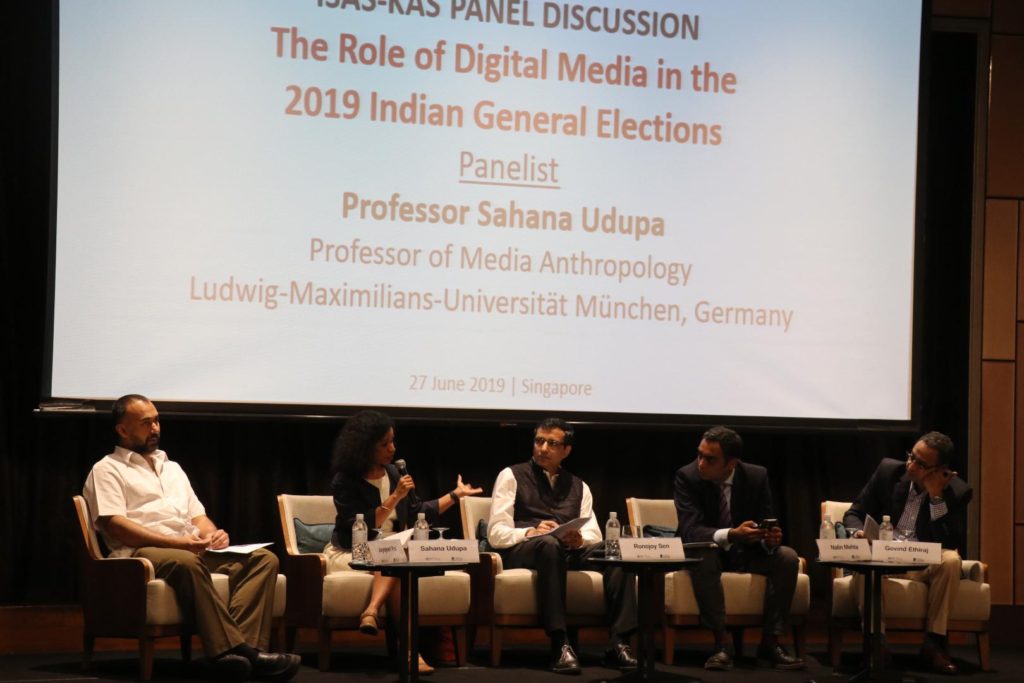
Social media in Indian general elections
Katharina Naumann, 2 July 2020
Konrad Adenauer Stiftung published a report on the public discussion organized in Singapore on the role of social media in Indian general elections, featuring Sahana Udupa’s comments that the impact of social media should be studied beyond the electoral results as they have enabled far reaching cultural shifts in political discourse. Read the full report here.

KULTUR IST KEINE WARE, SIE IST EINE LEBENSWEISE: INTERVIEW WITH SAHANA UDUPA
Sahana Udupa, Anika Landsteiner · 26 November 2019
Welche Bedeutung hat Cultural Appreciation heute online und offline? Mit Qiio spricht die aus Bangalore, Indien, stammende Medienanthropologin darüber, welche Faktoren für Cultural Appreciation online und offline wichtig sind, warum sie Memes kritisch gegenübersteht und wie sich kulturelle Anerkennung von Aneignung abgrenzen lässt.

COMPLEX CHALLENGES OF EXTREME SPEECH ONLINE CAN ONLY BE TACKLED IF MULTIPLE STAKEHOLDERS COLLABORATE
Elonnai Hickok & Sahana Udupa · Jun 21, 2019 · 12:30 pm
This special compilation demonstrates that addressing the contested space of online extreme speech and internet communication is a layered and complex challenge that requires collaboration from multiple stakeholders.We have articulated a set of priorities that emerged over the course of the discussions and writings. This list is not comprehensive and does not capture or represent every viewpoint but seeks to jumpstart a larger and more comprehensive discussion on addressing the challenges facing online content in India today.

CIVIL SOCIETY, INDUSTRY AND GOVERNMENT MUST JOIN HANDS TO PROTECT FREE SPEECH, CURB EXTREME SPEECH
Robert Faris · May 27, 2019 · 07:30 pm
Our next challenge is to find the mix of tools and approaches that strengthen public discourse that work in the digital age.

DEBATE OVER REGULATING RIGHT-WING EXTREME SPEECH ONLINE MUST SHIFT TO HARMS SUCH SPEECH CAN CAUSE
Bharath Ganesh · May 26, 2019 · 08:00 am
Prioritising free speech above the harms that extreme speech may cause has dominated the moderation strategies of social media platforms.

ANY REGULATION OF ONLINE SPEECH IN INDIA MUST SAFEGUARD THE RIGHTS TO FREE SPEECH AND PRIVACY
SFLC.in · May 15, 2019 · 06:30 pm
The law should also enable a quick take-down of content determined as illegal by the judiciary or appropriate government agencies.

TO ADDRESS EXTREME ONLINE CONTENT, ESPECIALLY OF THE POLITICAL KIND, AN ECOSYSTEM APPROACH IS NEEDED
Elonnai Hickok · May 14, 2019 · 06:30 pm
The ecosystem around the creation of content, including that related to elections, as well as its dissemination, promotion and consumption is complex.

FACT-CHECKING VIGILANTES IN INDIA ARE A BULWARK AGAINST THE MOVE TO A ‘POST-TRUTH’ WORLD
Sangeet Kumar · May 13, 2019 · 12:30 pm
The ecosystem of fact checking in India cuts across digital, television, and print media and even crosses over into the corporate domain.

EXTREME SPEECH: A PEOPLE-CENTRIC APPROACH WILL HELP HOLD GOVERNMENTS, SOCIAL MEDIA FIRMS ACCOUNTABLE
Sahana Udupa · May 12, 2019 · 08:00 am
Globally, content moderation around extreme speech has been difficult partly because of its elusive formats, inability to account for context, coded language.

STRATEGIES TO TACKLE EXTREME SPEECH ON WHATSAPP MUST BRING TOGETHER SOCIO-POLITICAL, DIGITAL WORLDS
Lipika Kamra & Philippa Williams · May 11, 2019 · 08:00 am
Research has shown that the circulation of digital content characterised as ‘extreme speech’ informs everyday public opinion.

HOW FAR CAN POLITICAL PARTIES IN INDIA BE MADE ACCOUNTABLE FOR THEIR DIGITAL PROPAGANDA?
Amogh Dhar Sharma · May 10, 2019 · 08:00 am
An army of unpaid volunteers are being used to spread political propaganda and fake news. This allows parties to shirk accountability

CAN EXTREME SPEECH ONLINE BE REGULATED WITHOUT CURBING FREE SPEECH? THIS SERIES FINDS OUT
Sahana Udupa, Elonnai Hickok, Edward Anderson · May 09, 2019 · 08:00 am
The articles highlight policy interventions, company practice, and civic intervention urgently needed to address the current challenges in online communication.

THE WANNABE VICTIMS: INDIA’S ONLINE RIGHT
15 Feb 2019
The past 10 years have witnessed the rise of digital ideological warriors. Who are they and what motivates them?

THE HINDU COLUMN FEATURES PROJECT PODCAST “ONLINE GODS”
24 November 2018
You know a medium has edged into the mainstream when everyone wants a piece of it; entertainers, news disseminators, persuaders, educators, even academic researchers.

“DIGITAL POLITICS IN MILLENNIAL INDIA” SYMPOSIUM 2018
16 March 2018
New Delhi, 16 March 2018: The national capital witnessed the grand launch of the International Symposium titled ‘Digital Politics in Millenial India’ at the New Academic Block of IIIT-Delhi.

DAINIK JAGRAN REPORT ON “DIGITAL POLITICS IN MILLENNIAL INDIA” SYMPOSIUM 2018
15 March 2018

INTERVIEW IN SUDDEUTSCHE ZEITUNG
6 March 2018
München – Es geht um unsere Würde, sagt sie. Unsere digitale Würde, die täglich angegriffen wird. Aus unterschiedlichen Motiven, abermit ähnlichenMethoden, sei es von Trump-Anhängern in den USA

MAYMAY WAHI BANAENGE I: AMBIGUOUS POLITICS IN GLOBALIZED AND LOCALIZED ONLINE MEMETIC CULTURES
06 July 2018
This post will begin with an example, and it is hoped that the process of fleshing it out shall help in identifying the dynamic processes that are involved in defining a meme

INTERNET SHUTDOWNS: AMENDMENT TO THE TELEGRAPH ACT AND MOBILE COMPANY LICENSES
03 April 2018
This blog post is the second in a series of blog posts from the project “Law, religious violence and Internet and social media regulation in India” funded by ONLINERPOL.
TV Cultura, 27 July 2022

Das langsame Vorgehen gegen Hassfluencer wie Andrew Tate
Heike Wippenfürth, 23 August 2022
In a news feature on social media hate influencers and misogynists online, Deutschlandfunk journalist Heike Wippenfürth spoke to Sahana Udupa about her research. Udupa pointed out that account suspensions will lead to hate influencers losing some momentum and audiences, but they will also go underground and find new ways.

Brazilian television channel TV Cultura features AI4Dignity
Brazilian television channel TV Cultura interviewed Sahana Udupa in their program on hate speech moderation and social media. Udupa highlighted the limitations of AI-assisted content moderation and how culturally coded expressions tend to escape content filters. She discussed the findings of AI4Dignity, the European Research Council funded proof of concept project, which has created a collaborative process model for involving communities in bringing cultural and contextual nuance to machine learning models.

IA não é capaz de detectar sozinha discurso de ódio nas redes, diz pesquisadora de Harvard
Ethel Rudnitzki, 27 July 2022
In an interview for the Brazilian news organization, Aos Fatos, Sahana Udupa spoke with Ethel Rudnitzki to highlight the challenges of online content moderation especially during election times. The interview was published as part of a series of reports Aos Fatos has published in the runup to the presidential elections in the country. Aos Fatos focuses on fact-checking and investigates disinformation and misinformation networks on social media.

Facebook convinced poll panel to settle on a voluntary code
Venkat Ananth & Deeksha Bhardwaj, 22 November 2021
“The voluntary code that was drawn (up) during the 2019 general elections was weak and insufficient, not least because of the very manner in which it was created…Double distancing on the part of the social media companies—first from being direct parties and second from enforceable obligation—showed that the voluntary code arrangement was weak from its very inception.” Sahana Udupa quoted in the article.

"At the heart of digital capitalism"
Lena Reuter & Sahana Udupa, 29 September 2020
Are social media connecting us or tearing society apart? How do trolls, fake news, memes, and online misinformation impact upon politics today? The Gerda Henkel Stiftung interviews project PI Udupa on critical aspects of digital politics. Here is the link to the full interview.

Tiktok and social media politics in India: ONLINERPOL research cited by Finnish Public Broadcasting Corporation
Maria Tolsa, 20 September 2020
Finnish Public Broadcasting Corporation “Yle” interviewed project PI Sahana Udupa on the impact of social media in mobilizing protests and conveying political messages in India, in the context of the Indian government’s decision to ban TikTok. Here is the link to the full article.

Social media in Indian general elections
Katharina Naumann, 2 July 2020
Konrad Adenauer Stiftung published a report on the public discussion organized in Singapore on the role of social media in Indian general elections, featuring Sahana Udupa’s comments that the impact of social media should be studied beyond the electoral results as they have enabled far reaching cultural shifts in political discourse. Read the full report here.

KULTUR IST KEINE WARE, SIE IST EINE LEBENSWEISE: INTERVIEW WITH SAHANA UDUPA
Sahana Udupa, Anika Landsteiner · 26 November 2019
Welche Bedeutung hat Cultural Appreciation heute online und offline? Mit Qiio spricht die aus Bangalore, Indien, stammende Medienanthropologin darüber, welche Faktoren für Cultural Appreciation online und offline wichtig sind, warum sie Memes kritisch gegenübersteht und wie sich kulturelle Anerkennung von Aneignung abgrenzen lässt.

COMPLEX CHALLENGES OF EXTREME SPEECH ONLINE CAN ONLY BE TACKLED IF MULTIPLE STAKEHOLDERS COLLABORATE
Elonnai Hickok & Sahana Udupa · Jun 21, 2019 · 12:30 pm
This special compilation demonstrates that addressing the contested space of online extreme speech and internet communication is a layered and complex challenge that requires collaboration from multiple stakeholders.We have articulated a set of priorities that emerged over the course of the discussions and writings. This list is not comprehensive and does not capture or represent every viewpoint but seeks to jumpstart a larger and more comprehensive discussion on addressing the challenges facing online content in India today.

CIVIL SOCIETY, INDUSTRY AND GOVERNMENT MUST JOIN HANDS TO PROTECT FREE SPEECH, CURB EXTREME SPEECH
Robert Faris · May 27, 2019 · 07:30 pm
Our next challenge is to find the mix of tools and approaches that strengthen public discourse that work in the digital age.

DEBATE OVER REGULATING RIGHT-WING EXTREME SPEECH ONLINE MUST SHIFT TO HARMS SUCH SPEECH CAN CAUSE
Bharath Ganesh · May 26, 2019 · 08:00 am
Prioritising free speech above the harms that extreme speech may cause has dominated the moderation strategies of social media platforms.

ANY REGULATION OF ONLINE SPEECH IN INDIA MUST SAFEGUARD THE RIGHTS TO FREE SPEECH AND PRIVACY
SFLC.in · May 15, 2019 · 06:30 pm
The law should also enable a quick take-down of content determined as illegal by the judiciary or appropriate government agencies.

TO ADDRESS EXTREME ONLINE CONTENT, ESPECIALLY OF THE POLITICAL KIND, AN ECOSYSTEM APPROACH IS NEEDED
Elonnai Hickok · May 14, 2019 · 06:30 pm
The ecosystem around the creation of content, including that related to elections, as well as its dissemination, promotion and consumption is complex.

FACT-CHECKING VIGILANTES IN INDIA ARE A BULWARK AGAINST THE MOVE TO A ‘POST-TRUTH’ WORLD
Sangeet Kumar · May 13, 2019 · 12:30 pm
The ecosystem of fact checking in India cuts across digital, television, and print media and even crosses over into the corporate domain.

EXTREME SPEECH: A PEOPLE-CENTRIC APPROACH WILL HELP HOLD GOVERNMENTS, SOCIAL MEDIA FIRMS ACCOUNTABLE
Sahana Udupa · May 12, 2019 · 08:00 am
Globally, content moderation around extreme speech has been difficult partly because of its elusive formats, inability to account for context, coded language.

STRATEGIES TO TACKLE EXTREME SPEECH ON WHATSAPP MUST BRING TOGETHER SOCIO-POLITICAL, DIGITAL WORLDS
Lipika Kamra & Philippa Williams · May 11, 2019 · 08:00 am
Research has shown that the circulation of digital content characterised as ‘extreme speech’ informs everyday public opinion.

HOW FAR CAN POLITICAL PARTIES IN INDIA BE MADE ACCOUNTABLE FOR THEIR DIGITAL PROPAGANDA?
Amogh Dhar Sharma · May 10, 2019 · 08:00 am
An army of unpaid volunteers are being used to spread political propaganda and fake news. This allows parties to shirk accountability

CAN EXTREME SPEECH ONLINE BE REGULATED WITHOUT CURBING FREE SPEECH? THIS SERIES FINDS OUT
Sahana Udupa, Elonnai Hickok, Edward Anderson · May 09, 2019 · 08:00 am
The articles highlight policy interventions, company practice, and civic intervention urgently needed to address the current challenges in online communication.

THE WANNABE VICTIMS: INDIA’S ONLINE RIGHT
15 Feb 2019
The past 10 years have witnessed the rise of digital ideological warriors. Who are they and what motivates them?

THE HINDU COLUMN FEATURES PROJECT PODCAST “ONLINE GODS”
24 November 2018
You know a medium has edged into the mainstream when everyone wants a piece of it; entertainers, news disseminators, persuaders, educators, even academic researchers.

“DIGITAL POLITICS IN MILLENNIAL INDIA” SYMPOSIUM 2018
16 March 2018
New Delhi, 16 March 2018: The national capital witnessed the grand launch of the International Symposium titled ‘Digital Politics in Millenial India’ at the New Academic Block of IIIT-Delhi.

DAINIK JAGRAN REPORT ON “DIGITAL POLITICS IN MILLENNIAL INDIA” SYMPOSIUM 2018
15 March 2018

INTERVIEW IN SUDDEUTSCHE ZEITUNG
6 March 2018
München – Es geht um unsere Würde, sagt sie. Unsere digitale Würde, die täglich angegriffen wird. Aus unterschiedlichen Motiven, abermit ähnlichenMethoden, sei es von Trump-Anhängern in den USA

MAYMAY WAHI BANAENGE I: AMBIGUOUS POLITICS IN GLOBALIZED AND LOCALIZED ONLINE MEMETIC CULTURES
06 July 2018
This post will begin with an example, and it is hoped that the process of fleshing it out shall help in identifying the dynamic processes that are involved in defining a meme

INTERNET SHUTDOWNS: AMENDMENT TO THE TELEGRAPH ACT AND MOBILE COMPANY LICENSES
03 April 2018
This blog post is the second in a series of blog posts from the project “Law, religious violence and Internet and social media regulation in India” funded by ONLINERPOL.
TV Cultura, 27 July 2022

IA não é capaz de detectar sozinha discurso de ódio nas redes, diz pesquisadora de Harvard
Ethel Rudnitzki · 27 July 2022 · 06:30 pm
In an interview for the Brazilian news organization, Aos Fatos, Sahana Udupa spoke with Ethel Rudnitzki to highlight the challenges of online content moderation especially during election times. The interview was published as part of a series of reports Aos Fatos has published in the runup to the presidential elections in the country. Aos Fatos focuses on fact-checking and investigates disinformation and misinformation networks on social media.

Facebook convinced poll panel to settle on a voluntary code
Venkat Ananth & Deeksha Bhardwaj · 22 November 2021 · 08:17 am
“The voluntary code that was drawn (up) during the 2019 general elections was weak and insufficient, not least because of the very manner in which it was created…Double distancing on the part of the social media companies—first from being direct parties and second from enforceable obligation—showed that the voluntary code arrangement was weak from its very inception.” Sahana Udupa quoted in the article.

"At the heart of digital capitalism"
Lena Reuter & Sahana Udupa, 29 September 2020
Are social media connecting us or tearing society apart? How do trolls, fake news, memes, and online misinformation impact upon politics today? The Gerda Henkel Stiftung interviews project PI Udupa on critical aspects of digital politics. Here is the link to the full interview.

Tiktok and social media politics in India: ONLINERPOL research cited by Finnish Public Broadcasting Corporation
Maria Tolsa, 20 September 2020
Finnish Public Broadcasting Corporation “Yle” interviewed project PI Sahana Udupa on the impact of social media in mobilizing protests and conveying political messages in India, in the context of the Indian government’s decision to ban TikTok. Here is the link to the full article.

Social media in Indian general elections
Katharina Naumann, 2 July 2020
Konrad Adenauer Stiftung published a report on the public discussion organized in Singapore on the role of social media in Indian general elections, featuring Sahana Udupa’s comments that the impact of social media should be studied beyond the electoral results as they have enabled far reaching cultural shifts in political discourse. Read the full report here.

KULTUR IST KEINE WARE, SIE IST EINE LEBENSWEISE: INTERVIEW WITH SAHANA UDUPA
Sahana Udupa, Anika Landsteiner · 26 November 2019
Welche Bedeutung hat Cultural Appreciation heute online und offline? Mit Qiio spricht die aus Bangalore, Indien, stammende Medienanthropologin darüber, welche Faktoren für Cultural Appreciation online und offline wichtig sind, warum sie Memes kritisch gegenübersteht und wie sich kulturelle Anerkennung von Aneignung abgrenzen lässt.

COMPLEX CHALLENGES OF EXTREME SPEECH ONLINE CAN ONLY BE TACKLED IF MULTIPLE STAKEHOLDERS COLLABORATE
Elonnai Hickok & Sahana Udupa · Jun 21, 2019 · 12:30 pm
This special compilation demonstrates that addressing the contested space of online extreme speech and internet communication is a layered and complex challenge that requires collaboration from multiple stakeholders.We have articulated a set of priorities that emerged over the course of the discussions and writings. This list is not comprehensive and does not capture or represent every viewpoint but seeks to jumpstart a larger and more comprehensive discussion on addressing the challenges facing online content in India today.

CIVIL SOCIETY, INDUSTRY AND GOVERNMENT MUST JOIN HANDS TO PROTECT FREE SPEECH, CURB EXTREME SPEECH
Robert Faris · May 27, 2019 · 07:30 pm
Our next challenge is to find the mix of tools and approaches that strengthen public discourse that work in the digital age.

DEBATE OVER REGULATING RIGHT-WING EXTREME SPEECH ONLINE MUST SHIFT TO HARMS SUCH SPEECH CAN CAUSE
Bharath Ganesh · May 26, 2019 · 08:00 am
Prioritising free speech above the harms that extreme speech may cause has dominated the moderation strategies of social media platforms.

ANY REGULATION OF ONLINE SPEECH IN INDIA MUST SAFEGUARD THE RIGHTS TO FREE SPEECH AND PRIVACY
SFLC.in · May 15, 2019 · 06:30 pm
The law should also enable a quick take-down of content determined as illegal by the judiciary or appropriate government agencies.

TO ADDRESS EXTREME ONLINE CONTENT, ESPECIALLY OF THE POLITICAL KIND, AN ECOSYSTEM APPROACH IS NEEDED
Elonnai Hickok · May 14, 2019 · 06:30 pm
The ecosystem around the creation of content, including that related to elections, as well as its dissemination, promotion and consumption is complex.

FACT-CHECKING VIGILANTES IN INDIA ARE A BULWARK AGAINST THE MOVE TO A ‘POST-TRUTH’ WORLD
Sangeet Kumar · May 13, 2019 · 12:30 pm
The ecosystem of fact checking in India cuts across digital, television, and print media and even crosses over into the corporate domain.

EXTREME SPEECH: A PEOPLE-CENTRIC APPROACH WILL HELP HOLD GOVERNMENTS, SOCIAL MEDIA FIRMS ACCOUNTABLE
Sahana Udupa · May 12, 2019 · 08:00 am
Globally, content moderation around extreme speech has been difficult partly because of its elusive formats, inability to account for context, coded language.

STRATEGIES TO TACKLE EXTREME SPEECH ON WHATSAPP MUST BRING TOGETHER SOCIO-POLITICAL, DIGITAL WORLDS
Lipika Kamra & Philippa Williams · May 11, 2019 · 08:00 am
Research has shown that the circulation of digital content characterised as ‘extreme speech’ informs everyday public opinion.

HOW FAR CAN POLITICAL PARTIES IN INDIA BE MADE ACCOUNTABLE FOR THEIR DIGITAL PROPAGANDA?
Amogh Dhar Sharma · May 10, 2019 · 08:00 am
An army of unpaid volunteers are being used to spread political propaganda and fake news. This allows parties to shirk accountability

CAN EXTREME SPEECH ONLINE BE REGULATED WITHOUT CURBING FREE SPEECH? THIS SERIES FINDS OUT
Sahana Udupa, Elonnai Hickok, Edward Anderson · May 09, 2019 · 08:00 am
The articles highlight policy interventions, company practice, and civic intervention urgently needed to address the current challenges in online communication.

THE WANNABE VICTIMS: INDIA’S ONLINE RIGHT
15 Feb 2019
The past 10 years have witnessed the rise of digital ideological warriors. Who are they and what motivates them?

THE HINDU COLUMN FEATURES PROJECT PODCAST “ONLINE GODS”
24 November 2018
You know a medium has edged into the mainstream when everyone wants a piece of it; entertainers, news disseminators, persuaders, educators, even academic researchers.

“DIGITAL POLITICS IN MILLENNIAL INDIA” SYMPOSIUM 2018
16 March 2018
New Delhi, 16 March 2018: The national capital witnessed the grand launch of the International Symposium titled ‘Digital Politics in Millenial India’ at the New Academic Block of IIIT-Delhi.

DAINIK JAGRAN REPORT ON “DIGITAL POLITICS IN MILLENNIAL INDIA” SYMPOSIUM 2018
15 March 2018

INTERVIEW IN SUDDEUTSCHE ZEITUNG
6 March 2018
München – Es geht um unsere Würde, sagt sie. Unsere digitale Würde, die täglich angegriffen wird. Aus unterschiedlichen Motiven, abermit ähnlichenMethoden, sei es von Trump-Anhängern in den USA

MAYMAY WAHI BANAENGE I: AMBIGUOUS POLITICS IN GLOBALIZED AND LOCALIZED ONLINE MEMETIC CULTURES
06 July 2018
This post will begin with an example, and it is hoped that the process of fleshing it out shall help in identifying the dynamic processes that are involved in defining a meme

INTERNET SHUTDOWNS: AMENDMENT TO THE TELEGRAPH ACT AND MOBILE COMPANY LICENSES
03 April 2018
This blog post is the second in a series of blog posts from the project “Law, religious violence and Internet and social media regulation in India” funded by ONLINERPOL.

IA não é capaz de detectar sozinha discurso de ódio nas redes, diz pesquisadora de Harvard
Ethel Rudnitzki · 27 July 2022 · 06:30 pm
In an interview for the Brazilian news organization, Aos Fatos, Sahana Udupa spoke with Ethel Rudnitzki to highlight the challenges of online content moderation especially during election times. The interview was published as part of a series of reports Aos Fatos has published in the runup to the presidential elections in the country. Aos Fatos focuses on fact-checking and investigates disinformation and misinformation networks on social media.

Facebook convinced poll panel to settle on a voluntary code
Venkat Ananth & Deeksha Bhardwaj · 22 November 2021 · 08:17 am
“The voluntary code that was drawn (up) during the 2019 general elections was weak and insufficient, not least because of the very manner in which it was created…Double distancing on the part of the social media companies—first from being direct parties and second from enforceable obligation—showed that the voluntary code arrangement was weak from its very inception.” Sahana Udupa quoted in the article.

"At the heart of digital capitalism"
Lena Reuter & Sahana Udupa, 29 September 2020
Are social media connecting us or tearing society apart? How do trolls, fake news, memes, and online misinformation impact upon politics today? The Gerda Henkel Stiftung interviews project PI Udupa on critical aspects of digital politics. Here is the link to the full interview.

Tiktok and social media politics in India: ONLINERPOL research cited by Finnish Public Broadcasting Corporation
Maria Tolsa, 20 September 2020
Finnish Public Broadcasting Corporation “Yle” interviewed project PI Sahana Udupa on the impact of social media in mobilizing protests and conveying political messages in India, in the context of the Indian government’s decision to ban TikTok. Here is the link to the full article.

Social media in Indian general elections
Katharina Naumann, 2 July 2020
Konrad Adenauer Stiftung published a report on the public discussion organized in Singapore on the role of social media in Indian general elections, featuring Sahana Udupa’s comments that the impact of social media should be studied beyond the electoral results as they have enabled far reaching cultural shifts in political discourse. Read the full report here.

KULTUR IST KEINE WARE, SIE IST EINE LEBENSWEISE: INTERVIEW WITH SAHANA UDUPA
Sahana Udupa, Anika Landsteiner · 26 November 2019
Welche Bedeutung hat Cultural Appreciation heute online und offline? Mit Qiio spricht die aus Bangalore, Indien, stammende Medienanthropologin darüber, welche Faktoren für Cultural Appreciation online und offline wichtig sind, warum sie Memes kritisch gegenübersteht und wie sich kulturelle Anerkennung von Aneignung abgrenzen lässt.

COMPLEX CHALLENGES OF EXTREME SPEECH ONLINE CAN ONLY BE TACKLED IF MULTIPLE STAKEHOLDERS COLLABORATE
Elonnai Hickok & Sahana Udupa · Jun 21, 2019 · 12:30 pm
This special compilation demonstrates that addressing the contested space of online extreme speech and internet communication is a layered and complex challenge that requires collaboration from multiple stakeholders.We have articulated a set of priorities that emerged over the course of the discussions and writings. This list is not comprehensive and does not capture or represent every viewpoint but seeks to jumpstart a larger and more comprehensive discussion on addressing the challenges facing online content in India today.

CIVIL SOCIETY, INDUSTRY AND GOVERNMENT MUST JOIN HANDS TO PROTECT FREE SPEECH, CURB EXTREME SPEECH
Robert Faris · May 27, 2019 · 07:30 pm
Our next challenge is to find the mix of tools and approaches that strengthen public discourse that work in the digital age.

DEBATE OVER REGULATING RIGHT-WING EXTREME SPEECH ONLINE MUST SHIFT TO HARMS SUCH SPEECH CAN CAUSE
Bharath Ganesh · May 26, 2019 · 08:00 am
Prioritising free speech above the harms that extreme speech may cause has dominated the moderation strategies of social media platforms.

ANY REGULATION OF ONLINE SPEECH IN INDIA MUST SAFEGUARD THE RIGHTS TO FREE SPEECH AND PRIVACY
SFLC.in · May 15, 2019 · 06:30 pm
The law should also enable a quick take-down of content determined as illegal by the judiciary or appropriate government agencies.

TO ADDRESS EXTREME ONLINE CONTENT, ESPECIALLY OF THE POLITICAL KIND, AN ECOSYSTEM APPROACH IS NEEDED
Elonnai Hickok · May 14, 2019 · 06:30 pm
The ecosystem around the creation of content, including that related to elections, as well as its dissemination, promotion and consumption is complex.

FACT-CHECKING VIGILANTES IN INDIA ARE A BULWARK AGAINST THE MOVE TO A ‘POST-TRUTH’ WORLD
Sangeet Kumar · May 13, 2019 · 12:30 pm
The ecosystem of fact checking in India cuts across digital, television, and print media and even crosses over into the corporate domain.

EXTREME SPEECH: A PEOPLE-CENTRIC APPROACH WILL HELP HOLD GOVERNMENTS, SOCIAL MEDIA FIRMS ACCOUNTABLE
Sahana Udupa · May 12, 2019 · 08:00 am
Globally, content moderation around extreme speech has been difficult partly because of its elusive formats, inability to account for context, coded language.

STRATEGIES TO TACKLE EXTREME SPEECH ON WHATSAPP MUST BRING TOGETHER SOCIO-POLITICAL, DIGITAL WORLDS
Lipika Kamra & Philippa Williams · May 11, 2019 · 08:00 am
Research has shown that the circulation of digital content characterised as ‘extreme speech’ informs everyday public opinion.

HOW FAR CAN POLITICAL PARTIES IN INDIA BE MADE ACCOUNTABLE FOR THEIR DIGITAL PROPAGANDA?
Amogh Dhar Sharma · May 10, 2019 · 08:00 am
An army of unpaid volunteers are being used to spread political propaganda and fake news. This allows parties to shirk accountability

CAN EXTREME SPEECH ONLINE BE REGULATED WITHOUT CURBING FREE SPEECH? THIS SERIES FINDS OUT
Sahana Udupa, Elonnai Hickok, Edward Anderson · May 09, 2019 · 08:00 am
The articles highlight policy interventions, company practice, and civic intervention urgently needed to address the current challenges in online communication.

THE WANNABE VICTIMS: INDIA’S ONLINE RIGHT
15 Feb 2019
The past 10 years have witnessed the rise of digital ideological warriors. Who are they and what motivates them?

THE HINDU COLUMN FEATURES PROJECT PODCAST “ONLINE GODS”
24 November 2018
You know a medium has edged into the mainstream when everyone wants a piece of it; entertainers, news disseminators, persuaders, educators, even academic researchers.

“DIGITAL POLITICS IN MILLENNIAL INDIA” SYMPOSIUM 2018
16 March 2018
New Delhi, 16 March 2018: The national capital witnessed the grand launch of the International Symposium titled ‘Digital Politics in Millenial India’ at the New Academic Block of IIIT-Delhi.

DAINIK JAGRAN REPORT ON “DIGITAL POLITICS IN MILLENNIAL INDIA” SYMPOSIUM 2018
15 March 2018

INTERVIEW IN SUDDEUTSCHE ZEITUNG
6 March 2018
München – Es geht um unsere Würde, sagt sie. Unsere digitale Würde, die täglich angegriffen wird. Aus unterschiedlichen Motiven, abermit ähnlichenMethoden, sei es von Trump-Anhängern in den USA

MAYMAY WAHI BANAENGE I: AMBIGUOUS POLITICS IN GLOBALIZED AND LOCALIZED ONLINE MEMETIC CULTURES
06 July 2018
This post will begin with an example, and it is hoped that the process of fleshing it out shall help in identifying the dynamic processes that are involved in defining a meme

INTERNET SHUTDOWNS: AMENDMENT TO THE TELEGRAPH ACT AND MOBILE COMPANY LICENSES
03 April 2018
This blog post is the second in a series of blog posts from the project “Law, religious violence and Internet and social media regulation in India” funded by ONLINERPOL.